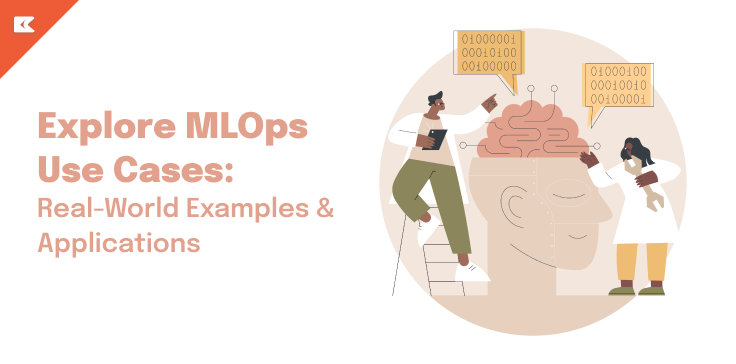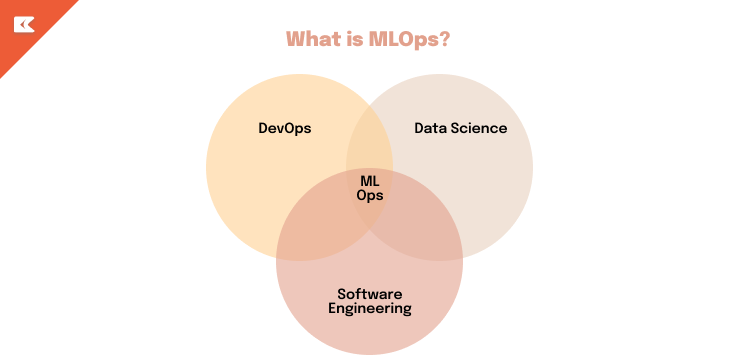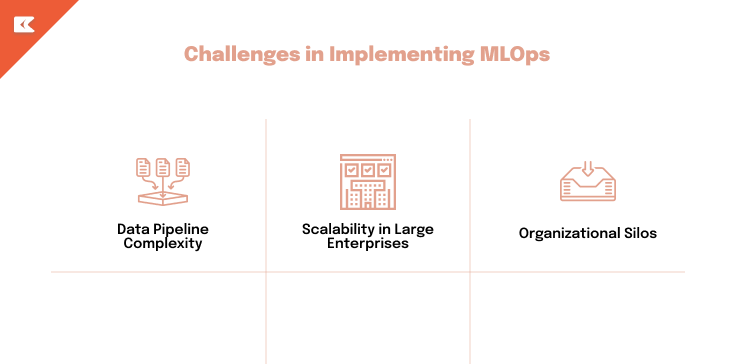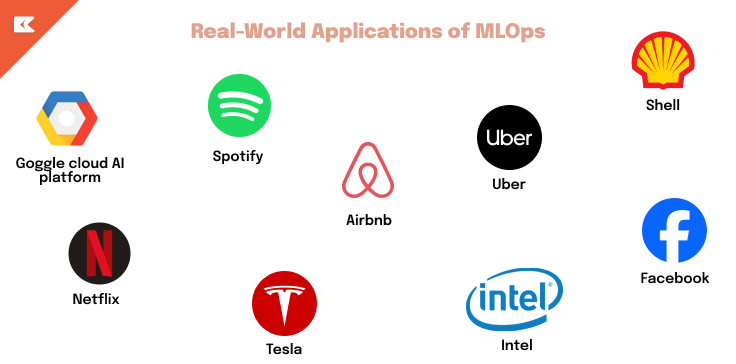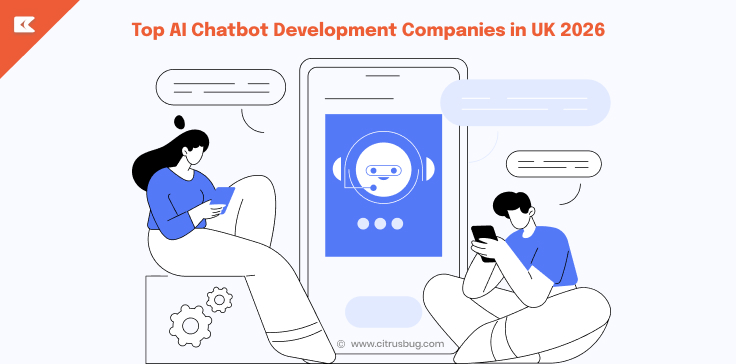Explore MLOps Use Cases: Real-World Examples & Applications
- September 24, 2024
-
4931 Views
- by Ishan Vyas
Machine Learning Operations (MLOps) is now a key procedure for businesses looking to maximize the deployment as well as maintenance of machine learning (ML) models. MLOps connects data science IT operation, as well as software engineering. It allows companies to expand AI strategies across businesses effectively. We’ll discuss the basics of what MLOps can do, the primary advantages, and MLOps Use Cases across different sectors, showing how companies such as Google, Uber, and Netflix use MLOps to remain ahead.
The MLOps market has been growing rapidly worldwide. Experts predict that this growth will continue to USD 13,321.8 million by 2030, exhibiting a CAGR of 43.5% during the forecast period, as industries are increasingly seeking AI and machine learning solutions.
What is MLOps?
MLOps abbreviated as Machine Learning Operations, refers to a set of methods that aim to streamline and automate the deployment, integration, and monitoring of models developed by machine learning. MLOps incorporates principles from each DevOps as well as ML to assist teams in automatizing the entire lifecycle of ML models, from creation to production. It encompasses all aspects of data prep training of models, from installation to ongoing monitoring and retraining.
Businesses that use MLOps benefit from less operational friction because they can automate routine tasks and ensure that models function effectively in production environments. This ensures high levels of reliability and accuracy throughout time which are crucial in the fields in which ML is a key component.
Key Benefits of MLOps
1. Enhanced Scalability and Efficiency
Businesses can scale their machine learning efforts across numerous teams and data pipelines using MLOps. Using and maintaining models using standard methods becomes unsustainable when organizations deal with ever-growing datasets. MLOps offers a simplified method that facilitates the scaling of machine learning activities, increasing productivity and cutting expenses.
2. Continuous Integration and Continuous Delivery (CI/CD)
CI/CD stands for continuous integration and delivery. MLOps makes it possible to integrate and distribute machine learning models continuously, much like CI/CD did for software development. This implies that models are automatically updated with fresh data, retrained as needed, and then re-integrated into the system without requiring human intervention. This skill is critical in fields like finance and healthcare where forecasts in real time are critical.
3. Better Model Performance Monitoring
Businesses may use MLOps to track the effectiveness of their machine learning models over time and spot problems early on, such as data drift or model degradation. Businesses may make real-time model tweaks with automated warnings and performance dashboards, which guarantees peak performance and long-term dependability.
MLOps Use Cases Across Various Industries
1. Continuous Integration/Deployment (CI/CD) in Healthcare
One of the critical MLOps Use Cases is applying Continuous Integration/Deployment (CI/CD) to streamline the deployment of machine learning models in healthcare. Successful MLOps projects often involve integrating CI/CD pipelines into their workflows. These MLOps projects ensure continuous updates and real-time performance tracking of healthcare organizations that streamlines the creation & deployment of models that predict outcomes, like the ones used for outcomes prediction.
One example is the creation of automatized pipelines for ML models, testing their capabilities on different datasets, and then updating the models based on feedback. This technique allows rapid iteration and helps ensure that models are accurate as time passes, ultimately enhancing the quality of care for patients. Automated testing and rapid deployment times ensure that models are reliable and flexible, and can be maintained at the highest level of performance.
2. Scalability and Resource Management in Retail
In the retail industry resources and scalability are key factors in the implementation of MLOps. The retail giant Walmart is a perfect example of the use case of MLops, to predict demand as well as fraud prevention. Through the use of MLOps, Walmart improves the accuracy of its predictive models, and ensures optimal inventory management and efficient logistics in the supply chain.
The capacity of models that use machine learning allows Walmart to manage large amounts of data to analyze customer behavior and offer more customized customer experience. It also enables the detection of fraud, where Walmart employs machine learning models to detect fraudulent transactions and avoid fraudulent transactions in advance.
3. Fraud Detection in Finance
In finance, use cases of ML within the financial industry include systems that analyze large datasets to identify suspicious activities. The most significant MLOps application is fraud detection. Financial institutions utilize ML models to identify & stop fraud in real-time. The models analyze huge volumes of transaction data to detect peculiar patterns, such as large transactions at untypical times or locations. Thus, this Use case of ML in finance becomes essential in real-time to provide a safeguard environment for both the institutions as well as their customers
For instance, JPMorgan Chase uses MLOps to keep track of and continually improve fraud prevention models. By automating the process of training and changing models, they can react quickly to changing threats and increase trust among customers. Automated monitoring of models and detection of anomalies make sure the accuracy of the system, and models can be implemented more quickly and with fewer mistakes.
4. Predictive Maintenance in Manufacturing
Predictive maintenance is a key use case of MLops for the manufacturing industry. Utilizing machine learning operations to analyze equipment data, businesses can predict machine failures before they occur, minimizing downtime & reducing repair costs. This proactive approach improves operational efficiency & extends the lifespan of machinery. With the help of MLops tools, companies can automate the entire process, ensuring that predictive maintenance models stay accurate and continuously improve over time.
For example, General Electric (GE), utilizes MLOps to control pre-planned maintenance programs for manufacturing equipment. They gather information via IoT devices and then use MLOps pipelines to train models that are based on real-time information which ensures accuracy in forecasts. These models assist GE in determining when equipment will require maintenance, which extends its lifespan and avoids costly breakdowns.
5. Personalized Marketing in Retail
Retailers are increasingly utilizing MLOps to offer targeted marketing on a massive scale. Through the analysis of customer data, machine-learning models can offer personalized products and customized ads that increase customer engagement. These use cases of MLOps are essential for helping retailers quickly iterate and deploy models while ensuring precision & efficiency over time.
Amazon is a prime example of MLOps being used to control its recommendation engine which analyzes patterns of behavior and preferences of users to recommend relevant products. Through automatizing the retraining and deploying of the models Amazon makes sure that its recommendations remain relevant as new information is gathered, enhancing the customer experience as well as driving sales.
6. Drug Discovery in Pharmaceuticals
The pharmaceutical industry makes use of MLOps for drug discovery by utilizing machine learning models to analyze vast amounts of chemical compounds. These models help identify potential combinations that could lead to new medicines. With MLOps tools, the entire process becomes more efficient, enabling continuous monitoring & retraining of models as new data becomes available. This allows pharmaceutical companies to streamline drug development, reducing the time and costs associated with bringing new treatments to market.
Pfizer makes use of MLOps to speed up the process of discovering new drugs. It employs machine learning models to study molecular information and determine the effectiveness of drugs. This MLOps use case will automate the process of retraining and testing models for Pfizer when new data becomes accessible, reducing the amount of time and expense for creating new drugs and enhancing the efficiency of clinical trials.
7. Customer Churn Prediction in Telecom
Telecom companies rely on machine learning models to predict customer churn and take proactive steps to retain loyal customers. MLOps plays a crucial role in managing these models by automating the retraining and deployment processes. This ensures that the models remain accurate and up-to-date as customer behavior changes. By using MLOps, telecom companies can enhance their ability to retain customers, reduce churn rates, and improve overall customer satisfaction.
For instance, Vodafone makes use of MLOps to enhance its models of churn prediction. Through analyzing patterns of customer usage as well as billing information and feedback from service providers Their models can determine the likelihood of customers to move to another company. Vodafone utilizes MLOps to ensure that their models are constantly updated to help their customer support teams target customers at risk by offering retention incentives in real-time.
8. Supply Chain Optimization in Retail
Retailers increasingly rely on machine learning to improve their supply chains by forecasting demand, coordinating inventory, & reducing logistics inefficiencies. MLOps helps these companies develop & update models to ensure accurate demand forecasts and effective stock management across regions. By automating model updates, MLOps enables retailers to maintain optimal inventory levels, improve logistics, and enhance overall supply chain efficiency.
For instance, Walmart utilizes MLOps to control its supply chain by leveraging ML algorithms that predict demand and maximize inventory distribution. By constantly updating its models with real-time sales as well as delivery information, Walmart ensures products are properly stocked, reducing the risk of shortages or overstocking eventually reducing expenses and increasing efficiency.
Real-World Applications of MLOps
Several industry leaders have successfully implemented various MLOps applications in the real-world to drive their machine-learning strategies forward:
1. Google Cloud AI Platform:
Google Cloud’s AI Platform provides a comprehensive MLOps service for companies of any size. Through the use of this platform, businesses can simplify the creation, deployment, and administration of their machine-learning models.
MLOps use cases:
Search algorithm optimization: Google uses MLOps to constantly improve its search algorithms, making sure that users get only the best and most pertinent relevant results from their searches.
Systems for recommendation: MLOps allows Google to enhance its recommendation systems by providing users with personalized recommendations for services, products, and other content.
2. Airbnb:
Airbnb has been able to successfully integrate MLOps into its operations to improve its pricing algorithms as well as results from searches. This has resulted in an increased competitive pricing strategy as well as a better user experience.
MLOps use cases:
Pricing dynamically: MLOps helps Airbnb adjust its prices in real-time according to variables like demand locations, location, and preferences.
Search results optimizing: MLOps ensures that Airbnb users locate the most relevant lodgings according to their preferences for search.
3. Uber:
Uber has implemented MLOps to improve different aspects of its operations, such as ride pricing as well as demand forecasting, and user experience.
MLOps use cases:
Price of ride: MLOps enables Uber to adjust its ride price dynamically in response to factors like traffic, demand, and the time of the day.
Demand prediction: MLOps can help Uber anticipate the demand for rides in various areas, which allows Uber to better allocate resources.
Prediction of ETA: MLOps improves the accuracy of Uber’s estimated arrival times, thus improving users’ experience.
4. Netflix:
Netflix makes use of MLOps to power the recommendation engine of Netflix, which provides users with personalized content recommendations.
MLOps use cases:
Content suggestion: MLOps helps Netflix analyze the history of user viewing and preferences, recommending relevant television and film shows.
Algorithm Optimization: MLOps allows Netflix to continually improve its recommendation algorithms so that its users get the most entertaining content.
5. Facebook:
Facebook uses MLOps to provide the basis for its news feed ranking and recommendation systems for content.
MLOps use cases:
News feeds ranking: MLOps assists Facebook in determining which order content is displayed in the news feeds of users about their interests and engagement.
Content suggestion: MLOps enables Facebook to recommend content that is relevant to users, increasing participation and growth of the community.
System detection: MLOps enables the system to detect abuse and Spam. It can be used to find and block fake accounts, spam, and potentially harmful content on the platform.
6. Spotify:
Spotify utilizes MLOps to improve the music recommendations system and provide users with a customized listening experience.
MLOps use cases:
Music suggestion: MLOps helps Spotify analyze the listening habits of users and preferences, recommending new music that is compatible with their preferences.
Playlist generation: MLOps lets Spotify create customized playlists based on users’ music preferences and listening habits.
7. Tesla:
Tesla‘s self-driving electric vehicles rely heavily on machine learning. MLOps plays an important role in the constant improvement of its algorithms for autonomous driving.
MLOps use cases:
Algorithms training: MLOps allows Tesla to train and upgrade its autonomous driving algorithms with huge quantities of data through its cars.
Security and reliability: MLOps helps Tesla identify and resolve potential safety concerns in its self-driving systems.
8. Intel:
Intel utilizes MLOps to improve the design of its chips by using models of machine learning for simulation and testing.
MLOps use cases:
Chip design optimization: MLOps helps Intel enhance the performance and efficiency of its chip designs by enhancing design parameters.
Simulating and Testing: MLOps allows Intel to test and simulate chip designs more efficiently while reducing the development time and cost.
9. Shell:
Shell has embraced MLOps to improve its energy production processes employing predictive models to assist with the maintenance of equipment.
MLOps use cases:
Predictive maintenance: MLOps can help Shell identify equipment failures and plan maintenance in advance, decreasing downtime and increasing the efficiency of operations.
Energy optimization: MLOps enables Shell to improve the energy production process by finding areas of improvement and cutting down on consumption.
10. LinkedIn:
LinkedIn makes use of MLOps to enhance its job-related recommendation system to help users find new jobs that are compatible with their skills and knowledge.
MLOps use cases:
Job suggestion: MLOps helps LinkedIn examine user profiles as well as job search history to suggest relevant jobs.
Talent recruitment: MLOps allows LinkedIn for job-seekers to be connected to potential employers more efficiently.
Challenges in Implementing MLOps
While MLOps offers tremendous benefits, organizations may face several challenges during implementation:
1. Data Pipeline Complexity
Building and maintaining complex data pipelines can be daunting. Proper data versioning and management are essential for ensuring the smooth deployment of models in production environments. Without a robust MLOps framework, organizations may struggle to manage these complexities.
2. Scalability in Large Enterprises
Scaling MLOps across large organizations with multiple teams and projects requires careful coordination. Managing multiple models in parallel, along with ensuring consistency in model updates, can be challenging without a strong infrastructure.
3. Organizational Silos
Collaboration between data scientists, machine learning engineers, and IT teams is frequently necessary for the successful deployment of MLOps. Ensuring the effectiveness of MLOps installations requires breaking down cultural barriers and silos between these entities.
Conclusion
MLOps is revolutionizing machine learning by automating model deployment, monitoring, and maintenance. This shift not only reduces operational costs and enhances scalability but also keeps businesses competitive. With its growing importance across industries like manufacturing and healthcare, MLOps is essential for leveraging machine learning to its fullest potential.
Leading companies such as Google, Netflix, and Tesla are already reaping the benefits of MLOps. MLOps is a need, not a choice, for businesses wishing to grow their AI projects. Don’t miss out on this transformative technology, to accelerate your MLops journey – contact us right now & see how MLOps can elevate your AI projects and give your business a competitive edge. we are providing free MLOPS consultation service for a limited time make sure to take the benefit.





 SaaS Development
SaaS Development Web Application Development
Web Application Development Mobile Application Development
Mobile Application Development Custom Software Development
Custom Software Development Cloud Development
Cloud Development DevOps Development
DevOps Development MVP Development
MVP Development Digital Product Development
Digital Product Development Hire Chatbot Developers
Hire Chatbot Developers Hire Python Developers
Hire Python Developers Hire Django Developers
Hire Django Developers Hire ReactJS Developers
Hire ReactJS Developers Hire AngularJS Developers
Hire AngularJS Developers Hire VueJS Developers
Hire VueJS Developers Hire Full Stack Developers
Hire Full Stack Developers Hire Back End Developers
Hire Back End Developers Hire Front End Developers
Hire Front End Developers AI Healthcare Software Development & Consulting
AI Healthcare Software Development & Consulting Healthcare App Development
Healthcare App Development EHR Software Development
EHR Software Development Healthcare AI Chatbot Development
Healthcare AI Chatbot Development Telemedicine App Development Company
Telemedicine App Development Company Medical Billing Software Development
Medical Billing Software Development Fitness App Development
Fitness App Development RPM Software Development
RPM Software Development Medicine Delivery App Development
Medicine Delivery App Development Medical Device Software Development
Medical Device Software Development Patient Engagement Software Solutions
Patient Engagement Software Solutions Mental Health App Development
Mental Health App Development Healthcare IT Consulting
Healthcare IT Consulting Healthcare CRM Software Development
Healthcare CRM Software Development Healthcare IT Managed Services
Healthcare IT Managed Services Healthcare Software Testing services
Healthcare Software Testing services Medical Practice Management Software
Medical Practice Management Software Outsourcing Healthcare IT Services
Outsourcing Healthcare IT Services IoT Solutions for Healthcare
IoT Solutions for Healthcare Medical Image Analysis Software Development Services
Medical Image Analysis Software Development Services Lending Software Development Services
Lending Software Development Services Payment Gateway Software Development
Payment Gateway Software Development Accounting Software Development
Accounting Software Development AI-Driven Banking App Development
AI-Driven Banking App Development Insurance Software Development
Insurance Software Development Finance Software Development
Finance Software Development Loan Management Software Development
Loan Management Software Development Decentralized Finance Development Services
Decentralized Finance Development Services eWallet App Development
eWallet App Development Payment App Development
Payment App Development Money Transfer App Development
Money Transfer App Development Mortgage Software Development
Mortgage Software Development Insurance Fraud Detection Software Development
Insurance Fraud Detection Software Development Wealth Management Software Development
Wealth Management Software Development Cryptocurrency Exchange Platform Development
Cryptocurrency Exchange Platform Development Neobank App Development
Neobank App Development Stock Trading App Development
Stock Trading App Development AML software Development
AML software Development Web3 Wallet Development
Web3 Wallet Development Robo-Advisor App Development
Robo-Advisor App Development Supply Chain Management Software Development
Supply Chain Management Software Development Fleet Management Software Development
Fleet Management Software Development Warehouse Management Software Development
Warehouse Management Software Development LMS Development
LMS Development Education App Development
Education App Development Inventory Management Software Development
Inventory Management Software Development Property Management Software Development
Property Management Software Development Real Estate CRM Software Development
Real Estate CRM Software Development Real Estate Document Management Software
Real Estate Document Management Software Construction App Development
Construction App Development Construction ERP Software Development
Construction ERP Software Development





